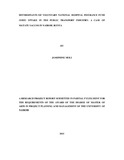| dc.description.abstract | The health sector in Kenya has gone through a lot of changes since independence from the dominantly government provided healthcare to cost sharing regime. None of the previous studies have ever focused on factors affecting uptake of voluntary social health insurance among employees in public transport industry. The employees are frequently exposed to frequent exposure to harmful fumes and long working hours. This is coupled with high accident rate and psychological effects related to the nature of their job. The purpose of the study was to establish the determinants of voluntary social health insurance uptake in the public transport industry with reference to Matatu Saccos in Nairobi. This study adopted a descriptive research design. The target population comprised of 11,053 drivers and conductors in Nairobi, and the senior management officers of the Matatu Saccos in Nairobi. A sample population of 384 drivers and conductors was used in this study. Primary data was collected using questionnaires and interview guides. Data collected was edited and coded using descriptive analysis methods in order to get meaningful results from the questionnaires, interview guides checklist and desktop findings. The qualitative data took an exploratory or conceptual content analysis process which is more ideal as the information gathered from the interview guides was large and could be time consuming if not well planned. A factor analysis was used to pick the factors with the highest weight. In addition the study used Karl Pearson's product moment correlation analysis to assess the relationship between the variables. This study found that most of the drivers and conductors working in the public transport industryare not registered with NHIF. The study concluded that the level of income has the highest effect on voluntary social health insurance uptake in the public transport industry, followed by premiums payable, then corporate image while level of awareness had the lowest effect on the voluntary social health insurance uptake in the public transport industry. The study recommends that to ensure that all the drivers and conductors are registered with NHIF, the government should carry out an advocacy campaign aimed at educating them of the need of social health insurance and how they can contribute, the amount of premium should be reduced, officials of the NHIF should go for a recruitment mission in the community and the corrupt management at the NHIF should be removed to enhance transparency. | en |

